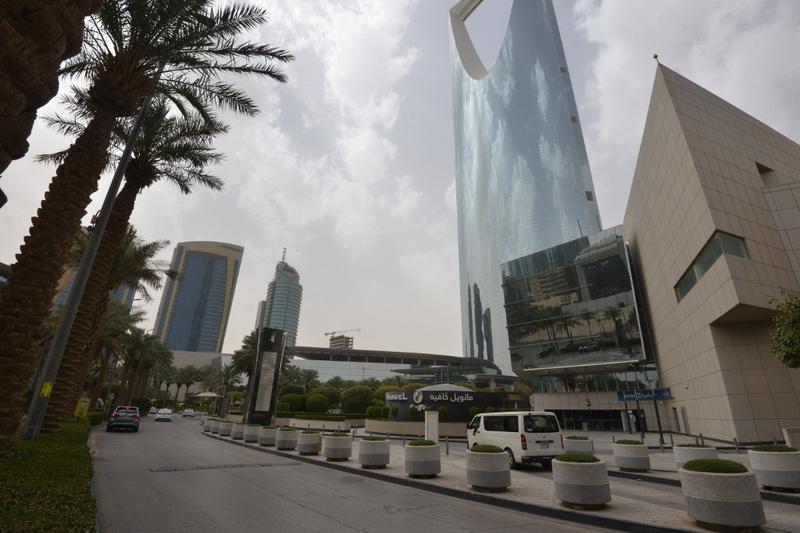 A photo taken on March 18, 2020 shows empty streets in Riyadh amid drastic measures to contain the novel coronavirus in the desert kingdom, including full closure of shopping centers, restaurants, and public gardens as well as suspending work in the private sector. Saudi Arabia called Tuesday for a "virtual" G20 summit over coronavirus.
(FAYEZ NURELDINE / AFP)
A photo taken on March 18, 2020 shows empty streets in Riyadh amid drastic measures to contain the novel coronavirus in the desert kingdom, including full closure of shopping centers, restaurants, and public gardens as well as suspending work in the private sector. Saudi Arabia called Tuesday for a "virtual" G20 summit over coronavirus.
(FAYEZ NURELDINE / AFP)
BEIJING - The world has now arrived at another critical juncture since the 2008 international financial crisis. Only this time is the health of both the global economy and humanity itself at stake.
To pull through this moment of twin crises - a raging coronavirus pandemic and a reeling global economy - requires purposeful guidance, as well as a swift and coordinated multilateral response.
To pull through this moment of twin crises - a raging coronavirus pandemic and a reeling global economy - requires purposeful guidance, as well as a swift and coordinated multilateral response
Saudi Arabia, the chair of the Group of 20 (G20) major economies this year, will stage an emergency virtual summit on Thursday.
ALSO READ: G20 to hold virtual summit on virus' social, economic impact
The meeting could not come at a more appropriate time.
It will be the first time for the G20 leaders to hold a tele-summit since the mechanism, which had used to only gather finance ministers and central bankers, was elevated to be the world's premier platform for international economic cooperation in 2008 and helped the world ride out the worst global economic crash since the 1929 Great Depression.
The situation is far more intractable this time. Ending the pandemic, which has led to shutdowns of factories and businesses in many parts of the world, and invigorating the global economy seem two contradictory missions.
So far, many governments have adopted measures to contain the disease and rescue their economies. However, the repeated stock market plunges indicate that they are not enough to calm investors' nerves and rebuild confidence.
At such a drastic moment, the G20 members, which account for around 90 percent of the gross world product, 80 percent of global trade and about two thirds of the entire human population, should once again step forward, join hands and champion a strong and well-organized collective global response.
READ MORE: Xi to attend G20 special summit on COVID-19
The most urgent task is to end the pandemic as soon as possible so as to restore confidence in the tumbling global markets.
According to the latest figures from the World Health Organization (WHO), COVID-19, the disease caused by a novel coronavirus, has infected over 370,000 people worldwide and more than 16,000 have died.
The still spreading global pandemic is the very reason behind the panic and economic disruption.
The G20 members should come together in unity, share critical information and align their response efforts, so as to effectively arrest the virus' global spread.
The world's top 20 major economies should join the IMF and World Bank to fight the slump in the global markets and drag the world economy back from the edge of another full-blown recession
One major problem exposed in the ongoing pandemic is a deficit in global public health governance, which resulted in a mainly country-based response so far when the crisis is beyond borders.
In the long run, a global architecture for the common health of mankind should be strengthened to better deal with future health emergencies and shore up confidence. To do that, the United Nations and the WHO should be given a core role.
Meanwhile, the world's top 20 major economies should join the International Monetary Fund and the World Bank to fight the slump in the global markets and drag the world economy back from the edge of another full-blown recession.
The good news is that the G20 has already set its action in motion. The G20 finance chiefs and central bankers agreed on Monday during their televised meeting to address the risks of debt vulnerabilities, develop a joint G20 Action Plan in response to COVID-19, and support financial stability and alleviate liquidity constraints for emerging markets and developing economies.
READ MORE: G20 says developing action plan to deal with global pandemic
The bad news is that protectionism and isolationism are often on the rise when a crisis hits. The G20 members need to speak in one loud voice to reaffirm multilateralism and find a way to keep the world trade running when some restrictive measures have to be taken to contain the virus.
The pandemic should never be taken as an excuse to disassemble global supply chains, or run each country's economy wall-to-wall.
Some 10 years ago, at the height of the international financial crisis, the G20 managed to salvage the global economy and showed that the human race is capable of addressing a crisis with solidarity.
This time the fight is even harder and the stakes much higher. The G20 should once again rally the confidence of countries around the world that as long as the international community works together in good faith, a total victory will be within reach.


